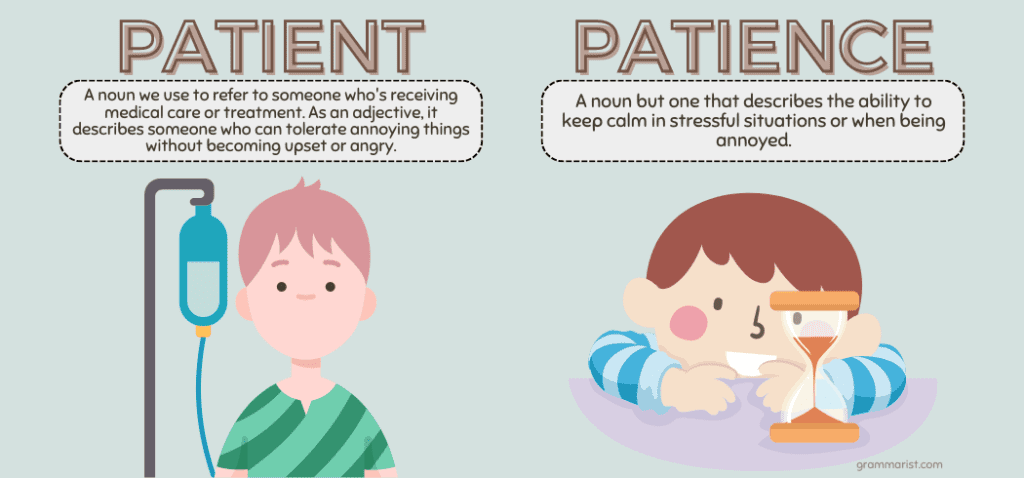English might be a hard language to learn because it’s full of things like homophones, to make it difficult. Homophones sound the same but have separate meanings and uses. Examples of these are words like red and read, would and wood, or, in this case, patients and patience. It’s essential not to get these two terms mixed up, and I’ll explain why right here in this guide.
Patient vs. Patience: Main Differences

So, the main difference between the terms “patient” and “patience” is their meanings and grammatical roles in a sentence.
“Patient” is a noun we use to refer to someone who’s receiving medical care or treatment. But it can also be an adjective to describe someone who can tolerate annoying things without becoming upset or angry, but only when in a singular form, “patient.” When you add an S at the end, it’s only the plural form of the noun.
- Noun: The patient will be staying at the hospital for their prenatal care.
- Plural noun: Patients get the best care at our facility.
- Adjective: My husband is so patient with our children.
Now, the word “patience,” which sounds just like the plural form above, is also a noun but one that describes the ability to keep calm in stressful situations or when being annoyed. It can get confusing when looking at its usage next to the adjective “patient.”
- Noun: I have a lot of patience when it comes to annoying customers. (Shows that they possess the ability to be patient)
- Adjective: I’m very patient with annoying customers. (Describes how they behave)
How Do You Spell Patience?
“Patience” is spelled with the letters p-a-t-i-e-n-c-e, the noun version of the adjective patient. But if you want to spell the plural noun for people who go to a hospital or care facility, then it’s p-a-t-i-e-n-t-s.
Is It Thanks for Being Patient or Patience?
The correct phrase you should use in this context is “thanks for being patient” because it describes how the person has behaved. If you said, “Thanks for being patience,” you’d be wrong, but you could say, “Thanks for having patience.”
Patient vs. Patience Pronounced
“Patient” and “patience” are homophones, which means they sound the same when you say them. The way they’re pronounced is pay-sh-unts.
Synonyms for Patient
Adjective Form
- Tolerant
- Forbearing
- Calm
- Easy-going
- Persevering
- Enduring
- Uncomplaining
Noun Form
- Victim
- Outpatient
- Inpatient
- Rehabilitant
Synonyms for Patience
- Endurance
- Tolerance
- Fortitude
- Composure
- Perseverance
- Self-control
Patient Examples in a Sentence

The following sentence examples show both the noun and adjective forms of patient.
- The doctor carefully examined each patient before making his diagnosis of their similar injuries. (noun patient)
- The cancer patient was very grateful for the nurse’s kind and attentive care while she stayed at the facility. (noun patient)
- The physical therapist helped me when I was a patient to regain my strength after surgery. (noun patient)
- My mother was a patient listener, always taking the time to understand my concerns as a child. (adjective patient)
- As a parent, you have to learn to be patient because children will test you in every way. (adjective patient)
Patience Examples in a Sentence
- My husband’s patience was tested as he waited in line for hours to get our food.
- I have an endless amount of patience when teaching my dog to potty.
- My old math teacher’s patience helped me get through the subject I hated most.
- Learning a new language requires a great deal of patience and persistence, so be prepared.
- With a little patience and practice, I mastered the art of knitting just like my grandmother.
Using Both Patients and Patience in a Sentence Together
- The nurse had admirable patience with the unruly patients yesterday.
Be Patient and Have Patience
So, I know it can get confusing when you’re looking at words that sound the same and possess multiple meanings. But just remember that “patient” is a noun and an adjective, so its meaning will depend on the context.
Enjoyed reading about homophones? Check out some others we covered:
